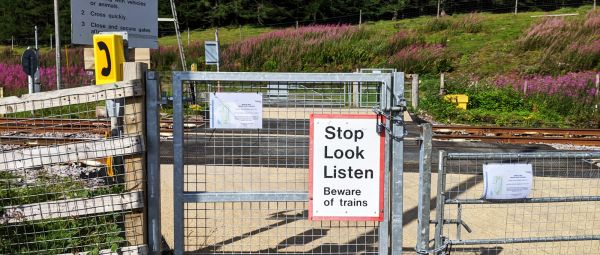New data reveal zero deaths at Scotland’s under-threat level crossings
Network Rail continues shutting crossings, yet hard-won stats prove very low risk

4 July 2023
New data obtained by Ramblers Scotland have revealed no walkers or cyclists have died at Scotland’s 360 ‘private’ level crossings in half a decade, despite Network Rail claiming safety is the reason for its controversial crossing closures.
Rail bosses have come under criticism from residents, businesses and politicians for closing more than 1,250 crossings in Britain since 2009 (source), including at Dalwhinnie in the Highlands.
Following a long-running Freedom of Information battle, rail chiefs have finally admitted to Ramblers Scotland that no “non-motorised users” have died at Scotland's ‘private’ level crossings* in the past five years in circumstances other than suicide.
In contrast, 34 pedestrians died on Scotland’s roads in 2020 alone (source). Meanwhile, physical inactivity contributes to 2,500 deaths in Scotland each year (source).
Walking charity Ramblers Scotland said the statistics showed Network Rail’s decision-making process is failing to weigh up the very low safety risk at crossings against the negative impact closures cause to tourism, rural connectivity, local economies and public health.
Director Brendan Paddy said: “Network Rail says safety is the reason it is closing so many level crossings, yet it has spent more than a year refusing to confirm to Ramblers Scotland whether any walkers have actually died at level crossings in Scotland.
“By forcing Network Rail to reveal this data, we now know the danger to walkers that carefully use level crossings is incredibly low compared to other risks we all face in daily life. Yet rail bosses seem to feel no cost is too high for others to pay for marginal safety gains that simplify their business.”
The Freedom of Information response came after 15 months of legal pressure from walking charity Ramblers Scotland working alongside Environmental Rights Centre for Scotland. Until this summer, Network Rail had repeatedly claimed it could not confirm whether there had been deaths of members of the public using ‘private’ level crossings.
Mr Paddy said: “Network Rail’s continued closure of level crossings risks turning many rural rail lines into impenetrable walls that cut communities and walkers off from the countryside that they need to support their health and wellbeing.
“For example, Network Railway’s actions at Dalwhinnie have a had a distressing impact for visitors who loved this historic route, and for locals trying to run tourism businesses or simply access the countryside on their doorsteps.”
Network Rail padlocked gates at Dalwhinnie level crossing in 2021 without any consultation - severing a route to popular lochs, glens and hills. The move sparked a huge backlash, including a 9,000-signature petition and an open letter signed by 15 major stakeholders including local MSPs.
There is also a high-profile ongoing dispute over lost access at Doubledykes level crossing for communities wanting to cross Fife’s new Levenmouth rail line, which is due to reopen in 2024.
Ramblers Scotland believes that Network Rail’s approach to level crossing closures undermines its pledge to “work collaboratively and sensitively” with communities living near railways.
Network Rail has previously claimed that pedestrians using ‘private’ level crossings could in certain circumstances be trespass, but British Transport Police confirmed to Ramblers Scotland in 2021 that no one had been charged with trespass for using a private level crossing in Scotland during the previous five years.

Crossing railway lines in Scotland
Level crossings help walkers cross railway lines as safely as possible. But the legal use by walkers of private level crossings is disputed.

How do paths work in Scotland?
Scotland’s world-class access rights mean you don’t need to stick to a path , but paths are very important in helping us all to enjoy our rights.

